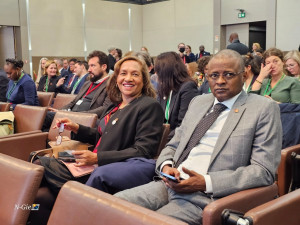The Minister of Education, Dulce de Jesus Soares, represented Timor-Leste at the first Global Summit of the School Meals Coalition, held in Paris, France, from October 18th to 19th, with the theme “School meals for a more equal and inclusive future”. 
This coalition, launched in 2021 by France and Finland, with the support of the World Food Program (WFP), aims to ensure that by 2030, all children worldwide will have access to healthy school meals.
School meals play a vital role in addressing problems such as hunger, unsustainable food systems and educational challenges, with an emphasis on gender equality. As well as benefiting children’s health and education, school meals also create jobs and promote sustainable food systems. 
The coalition currently brings together 90 member states, the European Union and the African Union, and around 100 diverse partners. The October summit aimed to highlight progress and hear the voices of those involved in implementing daily school meals, including local authorities and parliamentary networks. The coalition is an example of the success of multilateral partnerships in solving common challenges and is a crucial contribution to the fight against global food insecurity. 
Speaking at the summit, the Minister of Education praised the WFP’s continued support in implementing the school meals program in Timor-Leste, which currently benefits 315,000 students.
The Minister highlighted the national decision to “double the financial commitment to the national school meals program”, recognising that the country still “faces serious challenges in education, including malnutrition and stunted growth”. 
“This significant increase in the budget shows the [Government's] dedication to providing the children of Timor-Leste not only with education but also with the nutrition they need to thrive and become the drivers of our progress,” she added.
Dulce de Jesus Soares also stressed that “the school meals program in Timor-Leste has benefited not only students but also local farmers and the entire community involved in this process”.
The Minister of Education also expressed “pride in the promotion of school gardens, being one of the few, if not the only country in the world that has included the study and practice of school gardens as a curricular subject, providing school meals with fresh and nutritious produce, which also has an impact on the health of each family, with students taking this practice back to their families”.